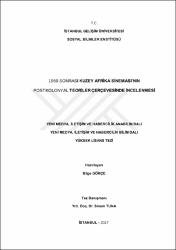| dc.contributor.author | Gökçe, Bilge | |
| dc.date.accessioned | 2019-01-21T08:44:33Z | |
| dc.date.available | 2019-01-21T08:44:33Z | |
| dc.date.issued | 2017-06-30 | |
| dc.date.submitted | 2017-06-30 | |
| dc.identifier.uri | http://hdl.handle.net/11363/931 | |
| dc.description | Danışman: Sinem Tuna. | en_US |
| dc.description.abstract | Bu çalışmada, 1950 sonrası Kuzey Afrika Sineması’ndan seçilen filmler, Kuzey Afrika’nın bağımsızlık döneminin siyasi atmosferi içinde değerlendirilmiştir. Postkolonyal teorinin, bağımsızlık sonrası eski sömürgeci güçler ile yerli burjuvazi arasındaki işbirliğinin dinamiklerini incelemesi ile “madun” sınıfın bir anatomisini çıkarması, bölgenin bağımsızlık dönemindeki sinemasal hareketlerin incelenmesi açısından bir temel oluşturmuştur. Ayrıca çalışmada incelenen hafıza, postkolonyal çalışmalarda ortaya çıkan “geçmiş” olgusunun temellendirilmesinde önemli bir kaynak sağlamaktadır. Bu çalışmada, postkolonyal çalışmalara referansla, “yeniden tarihyazımı” olarak değerlendirilen sinemanın incelenmesinde, “Madun Film Yapabilir mi?” sorusunun bir tartışması sunulmuştur. Bu tartışma zemininin sürdürüldüğü alan olarak, uzun yıllar Fransız kolonyalizm uygulamalarına maruz kalmış Fas, Tunus ve Cezayir seçilmiştir. Birinci bölümde ele alınan hafıza olgusu öncelikle resmi tarihin ortaya çıkışı ile nasıl dönüştüğü tartışılmıştır. Daha sonra tarihin önemli bir kısmını oluşturan kolonyal hareketlerin hafızaların dönüşümünü nasıl etkilediği incelenmiş ve bu inceleme kolonyalizm tarihinin öznesi olmuş halkların sinemasını anlamlandırmamızda yol gösterici olmuştur. İkinci bölümde, eski kolonyal toplumların bağımsızlık sonrasında Batı ile sürdürdüğü bağımlılık ilişkileri postkolonyal teori çerçevesinde incelenmiştir. Yerli burjuvazi ile Batı arasında sürdürülen bu ilişkiler, bağımsızlığın sadece kağıt üstünde gerçekleştiğini gösteren somut ifadeler olarak karşımıza çıkmaktadır. Bu bağlamda, eski kolonyal bölgede ortaya çıkan sinema, bu bağımlılık ilişkilerinin sonucunda meydana gelen bazı sınırlılıklara sahiptir. Çalışmada bu sınırlıklar, “Madun Film Yapabilir mi?” tartışmasından ortaya çıkan “kendi kendine oryantalizm” olgusuyla açıklanmıştır. Çalışmanın sonucunda, kolonyalizmin yoğun etkilerini yaşamış Kuzey Afrika toplumlarının postkolonal dönemde oluşturdukların sinemalarında, hem kolonyal dönemde hafızalarında meydana gelen dönüşümler hem de postkolonyal dönemde Batı ile sürdürülen ekonomik bağımlılığın izleri görülmüştür. Bu etkiler kendilerine ait bağımsız bir sinemanın oluşumunu sınırlandırmaktadır. | en_US |
| dc.description.abstract | In this study, selected films from post-1950 North African Cinema were examined within in the political conditions of the independence period of North Africa. Post-colonial theory is used in this study to examine the cinema of independence since it led to the creation of an anatomy of “the subaltern class” by examining the cooperation between former colonial powers and the native bourgeoisie after independence. Furthermore, “the collective memory” examined in the study provides an important source based on the “past” phenomenon that arises in postcolonial studies. In this study, the discussion of the question “Can the subaltern make film?” is presented with reference to postcolonial works within the review of the cinema that examined as “re-writing history”. Morocco, Tunusia and Algeria, which have been subjected to French colonialism for many years, were chosen as the area on which this debate continues. In the first chapter, the memory phenomena discussed firstly in relation to the emergence of official history. Then, it was examined how colonial movements, which constitute a significant part of history, affected the transformation of memories, and this examine has been guide for us to make sense of the people’s cinema, which became the subject of the history colonialism. In the second part, the post-independence relations of the former colonial societies with the West were examined with in the context of postcolonial theory. These relations, which are maintained between the native bourgeoisie and the West, appear as concrete expressions of independence only on paper. In this context, the cinema that emerges in the old colonial region has some limitations that are the result of these dependency relations. In the study, these limitations are explained as “self-orientalism” arising from the discussion “Can The Subaltern Make Film?”. As a result of the study, traces of North African societies in the postcolonial period, which experienced intense colonialism, showed signs of both colonial memory and economic dependency in the postcolonial period. These effects limit the formation of an independent cinema of their own. | en_US |
| dc.language.iso | tur | en_US |
| dc.publisher | İstanbul Gelişim Üniversitesi Sosyal Bilimler Enstitüsü | en_US |
| dc.rights | info:eu-repo/semantics/openAccess | en_US |
| dc.rights | Attribution-NonCommercial-NoDerivs 3.0 United States | * |
| dc.rights.uri | http://creativecommons.org/licenses/by-nc-nd/3.0/us/ | * |
| dc.subject | Research Subject Categories::SOCIAL SCIENCES | en_US |
| dc.title | 1950 sonrası Kuzey Afrika Sineması'nın postkolonyal teoriler çerçevesinde incelenmesi | en_US |
| dc.title.alternative | Analysis of the post-1950 North African Cinema in the context of the postcolonial theories | en_US |
| dc.type | masterThesis | en_US |
| dc.department | İstanbul Gelişim Üniversitesi | en_US |
| dc.relation.publicationcategory | Tez | en_US |



















